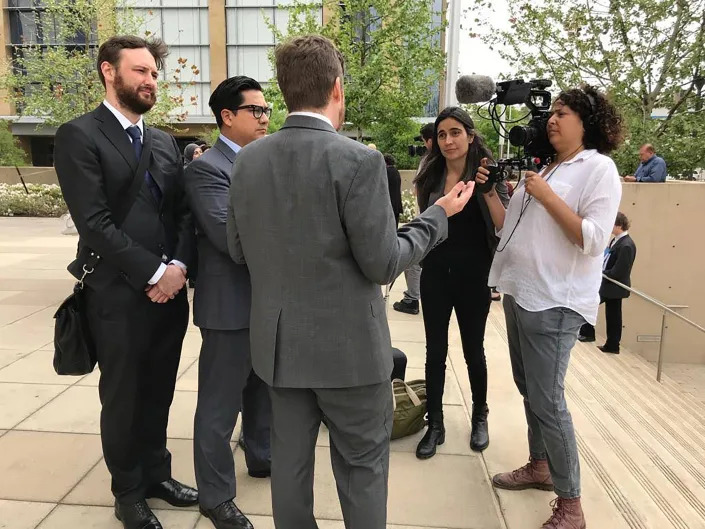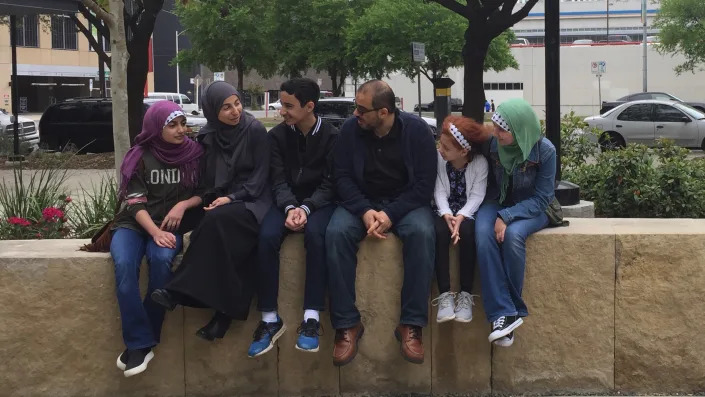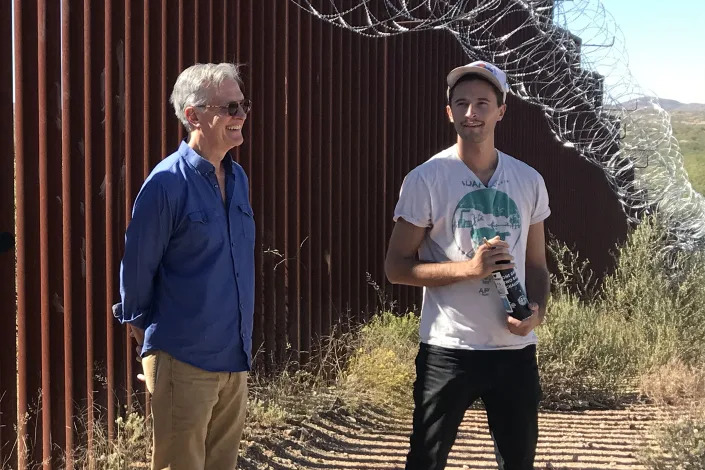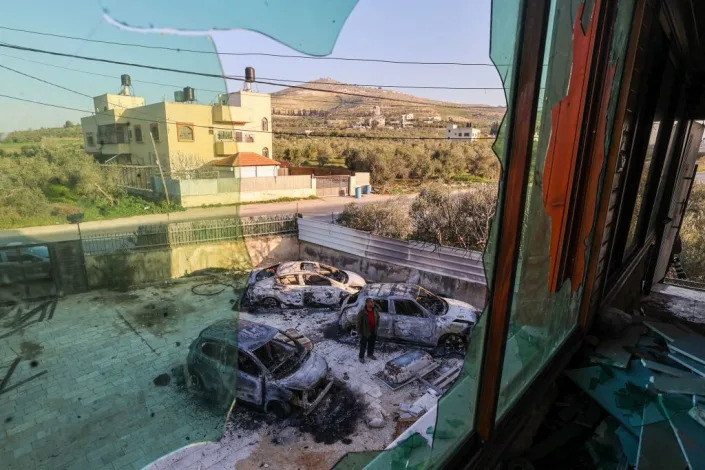Claims about offshore wind farms killing whales are unsubstantiated, scientists say
Ben Adler
·Senior Editor
Sat, March 4, 2023
The tail of a dead beached whale on Rockaway beach, Queens, New York, Dec. 13, 2022. (Bryan Bedder/Getty Images)
Since December, more than 23 whales have washed up dead along the east coast of the United States, leading wind energy skeptics to lay blame on the pending installation of offshore wind projects. But some scientists with the federal government say that there is no evidence to support those claims.
Last year, the Biden administration sold six leases to produce wind from turbines off the mid-Atlantic coast, part of its effort to fight climate change by boosting production of clean, renewable energy. Some pundits and politicians have concluded that preconstruction activity on new wind turbines has resulted in an increase in the death of whales.
Fox News’ Sean Hannity recently accused wind turbines of “contributing to the deaths of whales and bird life,” and Rep. Marjorie Taylor Greene, R-Ga., claimed dead whales “keep washing up on the beach from wind farms.” The mayors of 12 towns along the Jersey Shore signed a letter calling for a pause in offshore wind development. The environmental group Clean Ocean Action has joined Republican New Jersey Reps. Chris Smith and Jeff Van Drew to demand a suspension of wind development.
A wind turbine generates electricity at the Block Island Wind Farm on July 7, 2022, near Block Island, R.I. (John Moore/Getty Images)
On Tuesday, Fox News reported that Sean Hayes, chief of protected species for the National Oceanic and Atmospheric Administration (NOAA), wrote a memo last May warning that “the development of offshore wind poses risks to [whales] ... at varying stages, including construction and development, and include increased noise, vessel traffic, habitat modifications, water withdrawals.”
Federal agencies that track whale populations and the threats to them have reached a different conclusion, noting that the increase in whale deaths predates offshore wind leasing and is attributable to other causes, such as collisions with ships.
“To date, no whale mortality has been attributed to offshore wind activities,” Lauren Gaches, a spokesperson for NOAA Fisheries, said in a late January media teleconference. On Feb. 21, the U.S. Marine Mammal Commission provided an update, reiterating that “despite several reports in the media, there is no evidence to link these strandings to offshore wind energy development.”
Have whale deaths suddenly spiked after offshore wind leasing?
Wind turbines at the Block Island Wind Farm on July 7, 2022.
(John Moore/Getty Images)
No. The increase in whale deaths along the U.S. Atlantic coast began more than five years before offshore wind leasing. Since 2016, according to NOAA, humpback, minke and right whales have been experiencing an “unusual mortality event.” In that time, 335 dead whales of those three species have washed up on the east coast. Ten or more humpback whales have been stranded on beaches each year since then, with a high of 34 in 2017.
This winter has been especially notable, with 23 whales found since December, including 16 humpbacks — almost half as many that washed ashore in all of 2017, the peak year for humpback deaths.
No. The increase in whale deaths along the U.S. Atlantic coast began more than five years before offshore wind leasing. Since 2016, according to NOAA, humpback, minke and right whales have been experiencing an “unusual mortality event.” In that time, 335 dead whales of those three species have washed up on the east coast. Ten or more humpback whales have been stranded on beaches each year since then, with a high of 34 in 2017.
This winter has been especially notable, with 23 whales found since December, including 16 humpbacks — almost half as many that washed ashore in all of 2017, the peak year for humpback deaths.
Are the planned wind turbines to blame?
That would be quite a feat on their part, since construction has not even begun. Some wind energy opponents have suggested the vibrations of seismic testing being conducted for wind development may play a role. NOAA says this conjecture is unsupported and studies have found no effect on whales from seismic surveying.
“We do not have evidence that would support the connection between the [wind] survey work and these recent stranding events or any stranding events in the last several years,” said Ben Laws, deputy chief of the permits and conservation division of the NOAA Fisheries Office of Protected Resources.
Major environmental groups agree with NOAA’s conclusion. “There’s no evidence that we’ve seen implicating wind turbines and the deaths of whales on the East Coast," Greenpeace oceans director John Hocevar told USA Today.
So what is killing these whales?
Officials examine a dead beached whale on Rockaway beach, Dec. 13, 2022.
(Bryan Bedder/Getty Images)
Being struck by ships and getting caught in fishing nets seem to be the biggest reasons for the number of recent whale deaths.
NOAA Fisheries says it has performed necropsy examinations on “roughly half” of the 178 humpback whales that have died on the east coast since 2016. “Of the whales examined, about 40% had evidence of human interaction, either ship strike or entanglement,” said Sarah Wilkin, coordinator of Marine Mammal Health and Stranding Response.
All three whales that washed ashore during the third week in February showed signs of having been hit by a boat, according to federal investigators.
“Human-caused mortality and serious injury, particularly entanglements and vessel strikes, is the greatest threat to recovery of North Atlantic Right Whales,” the Marine Mammal Commission has stated.
Being struck by ships and getting caught in fishing nets seem to be the biggest reasons for the number of recent whale deaths.
NOAA Fisheries says it has performed necropsy examinations on “roughly half” of the 178 humpback whales that have died on the east coast since 2016. “Of the whales examined, about 40% had evidence of human interaction, either ship strike or entanglement,” said Sarah Wilkin, coordinator of Marine Mammal Health and Stranding Response.
All three whales that washed ashore during the third week in February showed signs of having been hit by a boat, according to federal investigators.
“Human-caused mortality and serious injury, particularly entanglements and vessel strikes, is the greatest threat to recovery of North Atlantic Right Whales,” the Marine Mammal Commission has stated.
Why are more whales being hit by ships in recent years?
People look at a dead, 35-foot humpback whale, in Lido Beach, N.Y., Jan. 31.
(Seth Wenig/AP Photo)
Two reasons stand out: the recovery of whale populations means there are more whales in shipping channels, and increasing global trade means there are more large vessels in U.S. waters. Since the 1986 ban on commercial whaling, the species has made a dramatic comeback from the brink of extinction. The population is especially robust in southern New England, according to Hayes’s memo.
“As the Gulf of Maine stock of humpback whales continues to grow, more young animals are choosing to overwinter along the Atlantic coast where they are vulnerable to being struck by ships and becoming entangled in fishing gear,” the Marine Mammal Commission noted in its update.
Global ship traffic has tripled since 1992. In the last two years, a post-pandemic surge in demand for consumer products has led to increased trans-oceanic commercial shipping. That is especially true in the New York-New Jersey area. In 2017, ports near New York City were opened for the first time to the world’s largest container ships, and traffic has boomed. In 2022, the Port Authority of New York and New Jersey moved 27% more cargo than in 2019.
Two reasons stand out: the recovery of whale populations means there are more whales in shipping channels, and increasing global trade means there are more large vessels in U.S. waters. Since the 1986 ban on commercial whaling, the species has made a dramatic comeback from the brink of extinction. The population is especially robust in southern New England, according to Hayes’s memo.
“As the Gulf of Maine stock of humpback whales continues to grow, more young animals are choosing to overwinter along the Atlantic coast where they are vulnerable to being struck by ships and becoming entangled in fishing gear,” the Marine Mammal Commission noted in its update.
Global ship traffic has tripled since 1992. In the last two years, a post-pandemic surge in demand for consumer products has led to increased trans-oceanic commercial shipping. That is especially true in the New York-New Jersey area. In 2017, ports near New York City were opened for the first time to the world’s largest container ships, and traffic has boomed. In 2022, the Port Authority of New York and New Jersey moved 27% more cargo than in 2019.
Is there any evidence that offshore wind farms harm whales?
The GE-Alstom Block Island Wind Farm, Sept. 14, 2016.
(Eric Thayer/Bloomberg via Getty Images)
There have only been very limited studies concerning the effect of offshore wind turbines on aquatic life, but so far they have not found any adverse affects. A pair of 2006 studies of offshore wind turbines in Germany and Denmark found the noise involved in wind energy development — including seismic testing, construction and the spinning of rotor blades — did not harm marine mammals’ auditory organs, although the study was not focused on whales specifically.
The metal bases of the first offshore wind turbines in the United States, off the coast of Virginia, have reportedly served as hospitable “artificial reefs” for schools of fish, algae and sea turtles. And off the coast of Taiwan, windmills are being used to help regenerate coral species.
Environmentalists say more study is needed and that it is still possible wind turbines could harm whales, but no proof has been found.
There have only been very limited studies concerning the effect of offshore wind turbines on aquatic life, but so far they have not found any adverse affects. A pair of 2006 studies of offshore wind turbines in Germany and Denmark found the noise involved in wind energy development — including seismic testing, construction and the spinning of rotor blades — did not harm marine mammals’ auditory organs, although the study was not focused on whales specifically.
The metal bases of the first offshore wind turbines in the United States, off the coast of Virginia, have reportedly served as hospitable “artificial reefs” for schools of fish, algae and sea turtles. And off the coast of Taiwan, windmills are being used to help regenerate coral species.
Environmentalists say more study is needed and that it is still possible wind turbines could harm whales, but no proof has been found.
Do other energy projects kill whales?
Oil on Huntington Beach, Calif., from a 126,000-gallon oil spill from an offshore oil platform, Oct. 3, 2021. (Nick Ut/Getty Images)
Offshore oil spills are documented to have killed many whales through inhalation of the toxic substance or consumption of contaminated fish. According to the conservation group Oceana, “at least 150 dolphins and whales were found dead” after the 2010 Deepwater Horizon oil rig explosion in the Gulf of Mexico. The Gulf of Mexico Bryde’s whales, among the most endangered whale species in the world, lost 17% of their population.
The 1989 Exxon Valdez spill in Alaska killed roughly one-third of the killer whales in two separate pods and stunted the growth of surviving calves.
What else is killing whales?
A dead whale on Rockaway Beach, Queens, N.Y., Feb. 17.
(Fatih Aktas/Anadolu Agency via Getty Images)
Fishing and climate change. The ropes and nets used for commercial fishing operations regularly entangle whales. A 2012 Department of Interior study found that 80% of right whales will be caught in fishing gear at least once in their lifetime. Whales are frequently injured in these situations, and they can be killed, as in the case of a whale that died in Massachusetts after suffering skull-bone fractures while trying to escape.
Another threat is rising water temperatures due to climate change. The average ocean temperature has risen 1.5 degrees Fahrenheit since 1901. Those warmer temperatures are killing the fish populations that North Atlantic whales rely on for food, according to a 2021 study in the journal Oceanography.
“Forced by climate-driven changes in the Gulf Stream, warm slope waters entered the region and created a less favorable foraging environment for the endangered North Atlantic right whale population,” the report noted. “Climate-driven changes in ocean circulation have altered the foraging environment and habitat use of right whales, reducing the population’s calving rate and exposing it to greater mortality risks from ship strikes and fishing gear entanglement.”
At a January press conference, Allison McLeod, policy director for the New Jersey League of Conservation Voters, hammered that point home.
“There is no evidence that any of the recent strandings so far have been tied to offshore wind,” she said. “The number one threat to the marine environment is climate change. Offshore wind is one of the most important tools we have to protect the entirety of our marine ecosystem.”
Fishing and climate change. The ropes and nets used for commercial fishing operations regularly entangle whales. A 2012 Department of Interior study found that 80% of right whales will be caught in fishing gear at least once in their lifetime. Whales are frequently injured in these situations, and they can be killed, as in the case of a whale that died in Massachusetts after suffering skull-bone fractures while trying to escape.
Another threat is rising water temperatures due to climate change. The average ocean temperature has risen 1.5 degrees Fahrenheit since 1901. Those warmer temperatures are killing the fish populations that North Atlantic whales rely on for food, according to a 2021 study in the journal Oceanography.
“Forced by climate-driven changes in the Gulf Stream, warm slope waters entered the region and created a less favorable foraging environment for the endangered North Atlantic right whale population,” the report noted. “Climate-driven changes in ocean circulation have altered the foraging environment and habitat use of right whales, reducing the population’s calving rate and exposing it to greater mortality risks from ship strikes and fishing gear entanglement.”
At a January press conference, Allison McLeod, policy director for the New Jersey League of Conservation Voters, hammered that point home.
“There is no evidence that any of the recent strandings so far have been tied to offshore wind,” she said. “The number one threat to the marine environment is climate change. Offshore wind is one of the most important tools we have to protect the entirety of our marine ecosystem.”
What about that NOAA memo?
In an email to Yahoo News, Gaches of NOAA said Hayes’s memo was designed to advise the Bureau of Ocean Energy Management (BOEM), which sells offshore wind development leases, on whether to create buffer zones to protect endangered North Atlantic right whales.
“Since then, NOAA Fisheries and BOEM have released a joint draft strategy to protect and promote the recovery of North Atlantic right whales while responsibly developing offshore wind energy,” Gaches said.
How can whales be better protected?
Photo: Getty Images
Last year, NOAA proposed a new rule that would extend speed limits to cover smaller ships and expand the zone in which the speed limits apply along the east coast. (If ships move slower they will cause less harm in collisions, according to the agency.) The agency also issued a report last year with a strategy to switch the fishing industry to ropeless fishing systems that would reduce the risk of entangling whales.
The Natural Resources Defense Council argues seismic testing should be subject to noise limits — the group is unpersuaded that it cannot hurt whales’ and dolphins’ hearing — and that more study for the underwater transmission cables used for offshore energy projects is needed to see if they risk entangling marine mammals.
Some environmental activists say that the stated concerns about whales from conservatives such as Hannity and Greene are insincere and ill-informed.
“It’s just a cynical disinformation campaign,” Hocevar of Greenpeace said. “It doesn’t seem to worry them that it’s not based in any kind of evidence.”
USA Today noted that none of the 12 mayors in New Jersey had ever spoken up about whale deaths previously, even though dead whales have been showing up in increasing numbers on their state’s beaches for the last six years. Two of them, however, have previously spoken out against offshore wind, which they worry will damage the local fishing and tourism industries.
“While the climate deniers and the right-wing pundits are tilting at windmills,” Hocevar said, “most of us are focused on the real threats to whales — climate change, entanglement with fishing gear, ship strikes and plastic pollution.”

























